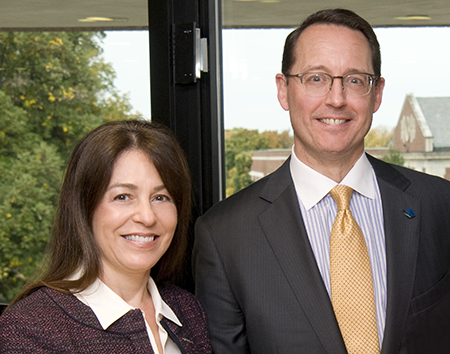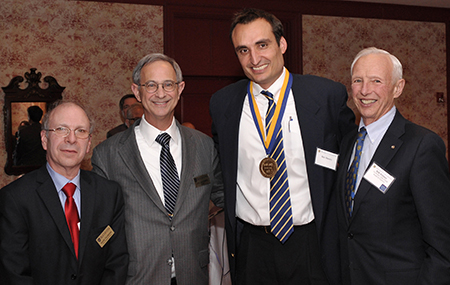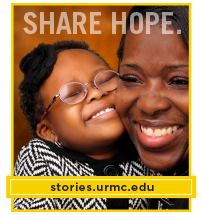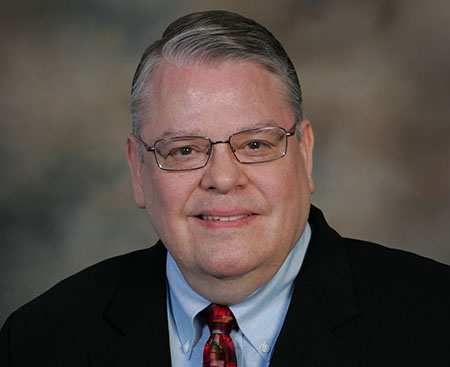February 2015
A Meliora Message

Our colors are blue and yellow, but during Rochester’s winter months, white makes a strong case. For some of you, however, green is still part of your daily palette. Regardless of the time of year or the prominent colors wherever you call home, the spirit of Meliora remains a commonality between us all.
Whether we are separated by streets, states, or several thousand miles, we remain connected by an ethos that drives us to be “ever better.” It has helped you connect and re-connect with peers and classmates during Meliora Weekend. Some of you shared its effect on your life in a Meliora Moment. And it has been a mutual motivator for supporting The Meliora Challenge.
In this month’s issue of Fast Forward we feature gifts, from St. Louis and Rochester, that are helping the University maintain its faculty excellence. This is just one example of how the expansive and dedicated network of alumni, faculty and staff, parents, and friends are fostering the Campaign’s momentum.
The University community knows no bounds, and that is why we will succeed in our mission to make the world “ever better.”
Wentworths Endow Director of Institute for Data Science

Robin P'11, P'16 and Timothy Wentworth P'11, P'16
Rochester natives Robin P’11, P’16 and Timothy Wentworth P’11, P’16 continue to build on a legacy that includes support for University students, facilities, the Annual Fund, and now faculty. With a $3 million commitment, the Wentworths have established the Robin and Tim Wentworth Directorship of the Institute for Data Science.
Founding and current director of the Institute for Data Science (IDS) Henry Kautz, professor of computer science in the Hajim School of Engineering & Applied Sciences, has been named the inaugural Wentworth Director.
“I could not be more grateful to Robin and Tim for their generous pledge to the University and Data Science Initiative,” said President Joel Seligman. “Their remarkable commitment to establish this directorship shows great vision as they are helping to secure our place at the forefront of this burgeoning field. With this gift, they are ensuring that we have exceptional leadership for the future.”
The IDS is a top priority for the University. As the centerpiece of the University’s current five-year strategic plan, the Data Science Initiative features the construction of a state-of-the-art building to house the IDS, as well as support for new faculty members with expertise in the field.
“It’s very exciting to be on the ground floor of something that will be of long-term strategic significance to the University and of major importance to the world,” said Tim, a member of the Board of Trustees. “Robin and I both believe strongly in thoughtful analytical solutions to problems, and data science captures our imagination. We hope that our commitment to the IDS at this important time has a compounding effect to draw in a wide range of support for the Institute so that it can really be built out to its complete potential.”
Over the years, the Wentworths’ vision and dedication have enabled potential throughout the University. In 2010, Robin and Tim—graduates of Monroe Community College—established the Wentworth Family Endowed Scholarship to assist students who are transferring to the University of Rochester from a community or junior college. Two years later, Wentworth Atrium in Raymond F. LeChase Hall was named in honor of the significant support the Wentworths gave to the Warner School of Education. And they provide ongoing support to the Rochester Parents Fund through their George Eastman Circle membership.
In addition to being members of the Northern New Jersey Regional Cabinet, Tim and Robin are members of the University’s Parents Council and are co-chairs of the Parents Initiative for The Meliora Challenge. Two of their three daughters are members of the University of Rochester community—Elizabeth Wentworth ’11 and Abigail Wentworth ’16.
Read more about the Wentworths’ gift and the inaugural Wentworth Director in the official press release.
Dorsey Installed as Inaugural Levy Professor

Mark Taubman, M.D., President Joel Seligman, Ray Dorsey '07M (Flw), and Chairman Emeritus G. Robert Witmer '59
As many as one million people in the U.S. are coping with Parkinson’s disease. For many, it can be extremely difficult to see a doctor in person due to the tremors, slowness of movement, and difficulty with walking and balance. Their inability to access care significantly increases the need for care by skilled nurses and the risk of hip fracture and even death.
What if patients didn’t have to leave their homes?
Ray Dorsey ’07M (Flw) is working on it. Dorsey, director of the Center for Human Experimental Therapeutics and the Center for Health and Technology, is leading the application of telemedicine models to treat patients who have Parkinson’s disease.
For work that is exemplary of Medicine of the Highest Order, Dorsey has been made the inaugural David M. Levy Professor in Neurology. On January 27, Dorsey and his position’s namesake, the late David M. Levy, were recognized by the University community at a formal installation ceremony.
“David was grateful to his doctors at the Medical Center for being able to stay active so late in life, despite having Parkinson’s disease,” said President Joel Seligman. “His enduring legacy will help future generations enjoy the same freedoms by enabling great physicians and researchers like Ray to battle Parkinson’s and other debilitating neurological diseases through the establishment of this professorship.”
David was a lifelong Rochesterian who died in 2011, at the age of 92. A U.S. Navy veteran who served in World War II, David practiced law for 60 years and was an active skier and fisherman. He continued to ski until he was 87 years old and went on his last fly fishing trip just months before his death. At age 90, he was still going into his law office.
The Levy Professorship, created in David’s name, was funded by a gift from his estate to honor his desire to support the Department of Neurology and research related to Parkinson’s disease. Dorsey makes an ideal first holder, as he and his colleagues are using web-based video conferencing to make virtual house calls, a treatment approach that could potentially allow more patients to live independently in their homes and still receive the specialized care they need.
“Ray is an extraordinary faculty member who exemplifies what endowed professorships are all about,” said Mark B. Taubman, M.D., CEO of the Medical Center and UR Medicine and dean of the School of Medicine and Dentistry. “His work has the potential to affect the lives of thousands, as it holds the key to providing subspecialty care to patients for whom a trip to Rochester is impractical or impossible.”
Dorsey is the recipient of numerous awards, including the American Academy of Neurology’s Jon Stolk Award in Movement Disorders for Young Investigators in 2010. His research has been published in leading medical, neurology, and economic journals, and he has been featured as an expert on National Public Radio, in The New York Times, and in The Wall Street Journal.







